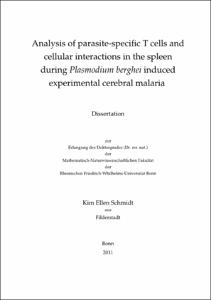Schmidt, Kim Ellen: Analysis of parasite-specific T cells and cellular interactions in the spleen during Plasmodium berghei induced experimental cerebral malaria. - Bonn, 2011. - Dissertation, Rheinische Friedrich-Wilhelms-Universität Bonn.
Online-Ausgabe in bonndoc: https://nbn-resolving.org/urn:nbn:de:hbz:5N-27042
Online-Ausgabe in bonndoc: https://nbn-resolving.org/urn:nbn:de:hbz:5N-27042
@phdthesis{handle:20.500.11811/5067,
urn: https://nbn-resolving.org/urn:nbn:de:hbz:5N-27042,
author = {{Kim Ellen Schmidt}},
title = {Analysis of parasite-specific T cells and cellular interactions in the spleen during Plasmodium berghei induced experimental cerebral malaria},
school = {Rheinische Friedrich-Wilhelms-Universität Bonn},
year = 2011,
month = dec,
note = {Vector-transmitted parasitic infections are a global health problem. Diseases such as malaria are a major health threat and economic burden for developing countries. In Sub-Saharan Africa malaria causing Plasmodium parasites may evoke life threatening complications, which mainly affect children under the age of five years. Pathogenesis of cerebral malaria is a multifactorial complex process that involves inflammatory mediators such as effector T cells and IFN-γ. Time, origin and cellular and molecular factors involved in early immune responses priming effector T cells responsible for the pathogenesis of cerebral malaria have been less investigated. In our study we were able to determine the presence of parasite specific cytotoxic T cells in spleen and brain during Plasmodium berghei infection. This enabled us to analyse cellular interactions involved in the priming of T cells directed against the parasite. The place of essential T cell priming during Plasmodium infections was determined in splenectomised mice, in which effector responses were reduced and experimental cerebral malaria (ECM) pathology was absent. Depletion of antigen- presenting cells, involved in maintaining the organized splenic structure, abrogated T cell priming and resulted in the loss of effector responses. Without either macrophages, DCs or B cells lytic activity and IFN-γ production by parasite-specific T cells was diminished and in the absence of effector responses ECM progression was suppressed. In detail, we provide evidence that macrophages, B cells and dendritic cells, as well as CD4+ T cells together with TLR-9 and IL-12 signalling comprise complex interactions affecting T cell generation during blood stage malaria leading to neuropathology.
Taken together our study suggests, that early immune responses during P. berghei infection are generated in the spleen and that distinct cells and cytokines drive gen-eration of parasite-specific T cells leading to subsequent pathology.},
url = {https://hdl.handle.net/20.500.11811/5067}
}
urn: https://nbn-resolving.org/urn:nbn:de:hbz:5N-27042,
author = {{Kim Ellen Schmidt}},
title = {Analysis of parasite-specific T cells and cellular interactions in the spleen during Plasmodium berghei induced experimental cerebral malaria},
school = {Rheinische Friedrich-Wilhelms-Universität Bonn},
year = 2011,
month = dec,
note = {Vector-transmitted parasitic infections are a global health problem. Diseases such as malaria are a major health threat and economic burden for developing countries. In Sub-Saharan Africa malaria causing Plasmodium parasites may evoke life threatening complications, which mainly affect children under the age of five years. Pathogenesis of cerebral malaria is a multifactorial complex process that involves inflammatory mediators such as effector T cells and IFN-γ. Time, origin and cellular and molecular factors involved in early immune responses priming effector T cells responsible for the pathogenesis of cerebral malaria have been less investigated. In our study we were able to determine the presence of parasite specific cytotoxic T cells in spleen and brain during Plasmodium berghei infection. This enabled us to analyse cellular interactions involved in the priming of T cells directed against the parasite. The place of essential T cell priming during Plasmodium infections was determined in splenectomised mice, in which effector responses were reduced and experimental cerebral malaria (ECM) pathology was absent. Depletion of antigen- presenting cells, involved in maintaining the organized splenic structure, abrogated T cell priming and resulted in the loss of effector responses. Without either macrophages, DCs or B cells lytic activity and IFN-γ production by parasite-specific T cells was diminished and in the absence of effector responses ECM progression was suppressed. In detail, we provide evidence that macrophages, B cells and dendritic cells, as well as CD4+ T cells together with TLR-9 and IL-12 signalling comprise complex interactions affecting T cell generation during blood stage malaria leading to neuropathology.
Taken together our study suggests, that early immune responses during P. berghei infection are generated in the spleen and that distinct cells and cytokines drive gen-eration of parasite-specific T cells leading to subsequent pathology.},
url = {https://hdl.handle.net/20.500.11811/5067}
}






